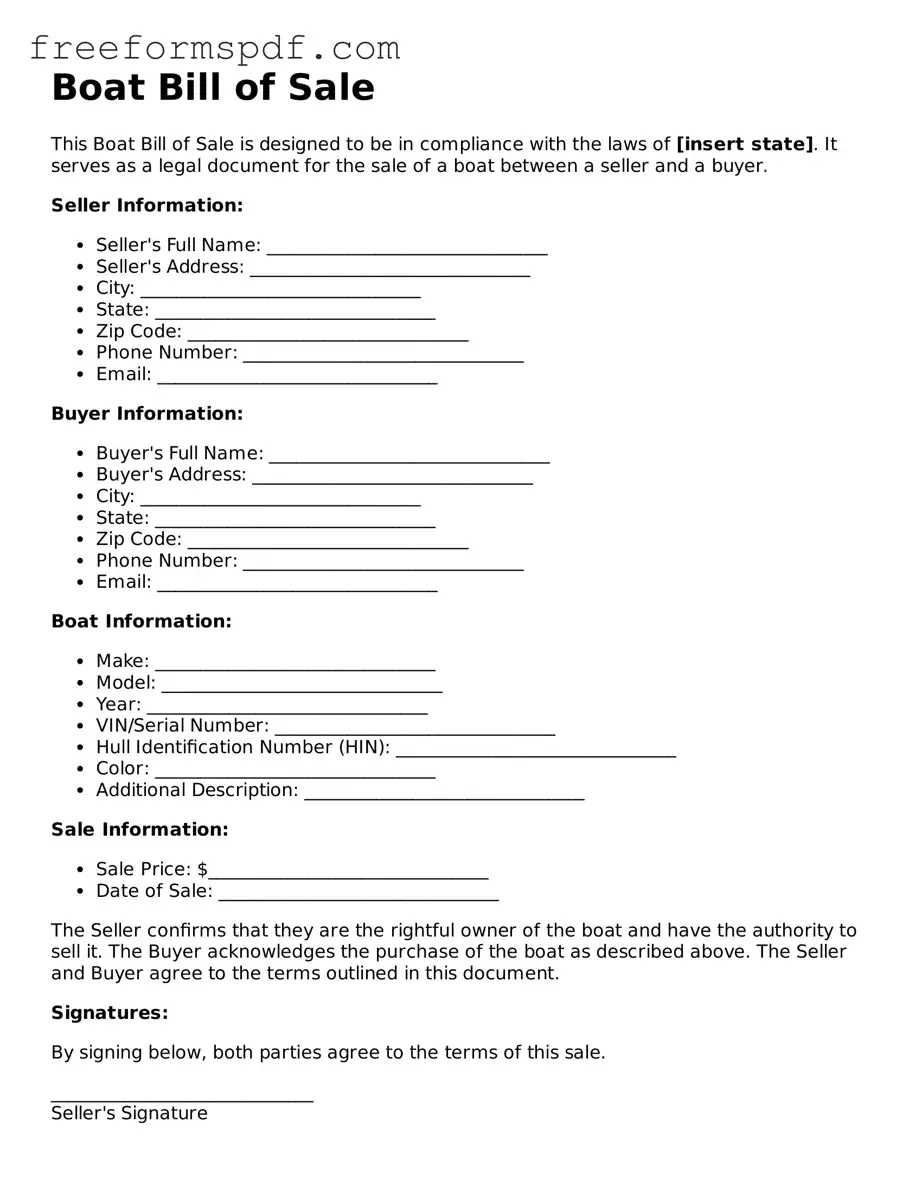Boat Bill of Sale Document
Boat Bill of Sale - Customized for Each State
Common mistakes
-
Failing to include the correct date of the sale. This is crucial for establishing the timeline of ownership.
-
Not providing accurate vessel details. This includes the make, model, year, and hull identification number (HIN). Inaccurate information can lead to complications later.
-
Leaving out the seller’s and buyer’s information. Both parties need to include their full names and addresses. Omitting this can cause issues with ownership transfer.
-
Neglecting to specify the purchase price. Clearly stating the amount helps prevent disputes and clarifies the transaction.
-
Not signing the document. Both the seller and buyer must sign the Boat Bill of Sale. A missing signature can render the document invalid.
-
Forgetting to include any additional terms or conditions of the sale. If there are warranties or agreements, they should be clearly stated.
-
Using a generic template without customizing it. Each sale is unique, and a one-size-fits-all approach may not cover specific needs.
Learn More on This Form
-
What is a Boat Bill of Sale?
A Boat Bill of Sale is a legal document that records the transfer of ownership of a boat from one party to another. It serves as proof of the transaction and includes important details about the boat, the buyer, and the seller.
-
Why do I need a Boat Bill of Sale?
This document is essential for several reasons. It protects both the buyer and seller by providing a clear record of the sale. It can also be required for registration purposes with state authorities. Additionally, it helps establish the sale price and date, which can be useful for tax purposes.
-
What information is included in a Boat Bill of Sale?
A typical Boat Bill of Sale includes:
- The names and addresses of the buyer and seller
- Details about the boat, such as make, model, year, and hull identification number (HIN)
- The sale price
- The date of the sale
- Signatures of both parties
-
Is a Boat Bill of Sale required in all states?
Requirements can vary by state. While many states require a Boat Bill of Sale for registration, others may not. It’s important to check your state’s specific regulations to ensure compliance.
-
Can I create my own Boat Bill of Sale?
Yes, you can create your own Boat Bill of Sale. However, it’s crucial to include all necessary information and ensure that it meets your state’s requirements. Many templates are available online that can help guide you in creating a comprehensive document.
-
Do I need to have the Boat Bill of Sale notarized?
Notarization is not typically required for a Boat Bill of Sale, but it can provide an extra layer of security and verification. Some buyers or sellers may prefer to have the document notarized to prevent disputes in the future.
-
What should I do after completing the Boat Bill of Sale?
Once the Boat Bill of Sale is completed and signed by both parties, make copies for your records. The buyer should keep the original document for registration purposes. It’s also a good idea to notify your state’s boat registration office about the change of ownership.
Misconceptions
When it comes to the Boat Bill of Sale form, several misconceptions can lead to confusion for buyers and sellers alike. Here are five common misunderstandings, along with clarifications to help you navigate the process more easily.
- It’s only necessary for high-value boats. Many people believe that a bill of sale is only important for expensive vessels. In reality, this document is crucial for any boat transaction, regardless of the price. It serves as proof of ownership and protects both parties involved.
- Verbal agreements are enough. Some may think that a handshake or verbal agreement suffices. However, without a written record, disputes can arise later. A bill of sale provides clear documentation of the transaction and helps prevent misunderstandings.
- The form is the same in every state. It’s a common belief that the Boat Bill of Sale form is standardized across the country. In truth, requirements can vary by state. It’s essential to check local regulations to ensure compliance and avoid potential legal issues.
- Only the seller needs to sign it. Some assume that only the seller’s signature is necessary. In fact, both the buyer and seller should sign the bill of sale. This mutual agreement reinforces the validity of the transaction and provides protection for both parties.
- It doesn’t need to be notarized. Many people think that notarization is optional. While it may not be required in all states, having the document notarized adds an extra layer of authenticity and can be beneficial if disputes arise later.
Understanding these misconceptions can help you approach the buying or selling process with confidence. Always ensure you have the proper documentation to protect your interests.
Other Types of Boat Bill of Sale Forms:
Printable Livestock Bill of Sale - A document used to transfer ownership of livestock from seller to buyer.
Bill of Sale for Furniture - Discloses ownership information to avoid future claims.
In addition to understanding the importance of the Nyc Apartment Registration Form, landlords and property managers can also benefit from utilizing templates to streamline the process. By using resources like NY Templates, they can ensure that all necessary information is collected accurately and efficiently, further aiding in compliance with housing regulations.
Bill of Sale Tractor - Establishes terms and conditions for the sale.
